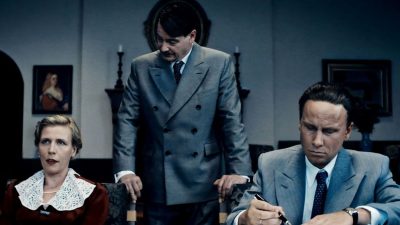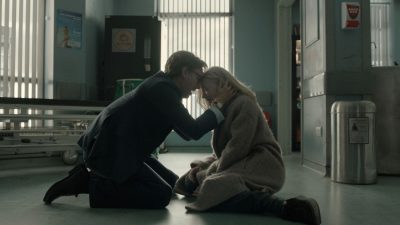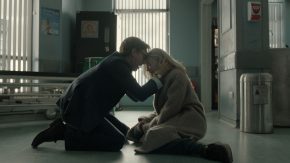Composer, conductor, pianist, a passionate promoter of music, and an ebullient showman – Leonard Bernstein was all of these once. The Kennedy family adored him, President Nixon’s description of him is not fit to be printed, the FBI compiled a 700-page file on him, the expression “radical chic” was coined to describe him, and he was happy to embrace and kiss the women and the men he liked on the lips. Bernstein’s life and career is perhaps an open book: from the fateful substitution as conductor in 1943 (he filled in for Bruno Walter at a concert with the New York Philharmonic), through the worldwide success of West Side Story or even the Turkey Trot conducted and danced in Budapest, right to the last concert in August in 1990 in which he suffered a coughing fit.
Yet Bernstein the opera composer seems to be less well known even today. In fact we might easily feel that West Side Story overshadows almost every other stage work by Bernstein: the musicals, operettas, and operas. However, the overall picture is fast changing, and we live in a time of rediscovery of Bernstein: the centenary of his birth marks a special moment in this process, in Hungary too. After Trouble in Tahiti produced as part of the Bernstein Marathon at the Müpa Budapest, now the Vienna production of his last opera, A Quiet Place comes to Budapest on 9 and 10 April, with Neue Oper Wien giving the Hungarian premiere.
From his mid-20s right until his death, Leonard Bernstein was America’s favourite, and the pride of the nation: the first American-born conductor to conquer the world. He understood and felt the American style: in his behaviour, his gestures, and his keen sense for publicity. But at the same time, in the words of Walt Whitman, he heard America singing, and thus even as the darling of the nation he became a tireless social critic of his homeland. And not only, or rather not primarily by what he said, but through his musical works for the stage. The hope and hopelessness of the oft-mentioned “American dream” was naturally powerfully shown already in West Side Story, and this made the musical a “progressive work” in the countries of the eastern bloc, including Hungary. But in other works Bernstein’s approach to this theme was if anything even bolder.
His existential and psychological approach to middle-class suburban life proved to be an even trickier problem, on the stage just as in reality. Trouble in Tahiti, composed in 1951–52 to his own libretto, shows a world of comfortably furnished private hells: family members become alienated from one another, and the baggage of mundane hopelessness is carted from one session with the psychoanalyst to the next. The musical style is a felicitous amalgam of traditional operatic solutions and popular-modern ideas. Bernstein went back to this one-act opera at the beginning of the 1980s, when he again started to scratch at the surface of the collective illusion of the American dream. This was to be A Quiet Place, premiered in Houston in June 1983, which examined the fraying life of the family in the piece after thirty years. The opera, to a libretto by Stephen Wadsworth, has more resignation and sentimentality, and alongside practical social critique it provided the audience with a few plot twists worthy of soap operas. An audience which, it cannot be denied, gave a frosty reception to Bernstein’s last stage work at its world premiere in Houston. As the New York Times critic put it: “To call [the opera] a pretentious failure is putting it kindly.”

Walter Kobera, photo by Armin_Bardel
In spite of the flop, Bernstein had a special place in his heart for A Quiet Place right to his death. Thus, in the twice quickly revised opera he inserted and partly reworked material from Trouble in Tahiti, and in the mid-1980s the opera reached La Scala Milan and the Vienna State Opera. Yet the excitingly contradictory work that remained has only in recent years begun to enter the international repertoire. For instance, thanks to Kent Nagano, who is thoroughly committed to Bernstein’s opera, and in 2013 in the Berlin Konzerthaus, then in Dresden and Dortmund, at the helm of the Ensemble Modern, performed the work with a slightly altered structure and chamber-music orchestration. Since then he has performed it in Montreal at the 2014 Gay Pride, because with its audacity A Quiet Place links into queer themes.
This is the version that Neue Oper Wien, who by now have a tradition of collaboration with Müpa Budapest, will be bringing to the Budapest Spring Festival audiences, in a dramaturgy and orchestration revised by Garth Edwin Sunderland. An opera of restless novelty by a man born a century ago.
AVANT-GARDE FROM NEXTDOOR
Le Grand Macabre, Paradise Reloaded (Lilith), The Nose – the cooperation between Neue Oper Wien and the Müpa Budapest in recent years has helped bring Budapest audiences into contact with the twentieth-century avant-garde and current contemporary music, and the critical reaction to the productions clearly marks the success of the enterprise. “The achievement is more than convincing” wrote Tamás Koltai in praise of a semi-staged premiere of Péter Eötvös’s opera, while of the previous year’s performance of György Ligeti’s opera János Malina enthused: “the effect was entrancingly and massively uniform”. In regard to their Vienna-Budapest production of Shostakovich’s youthful masterpiece the writer of these lines praised things such as the exemplary teamwork, and the musicality and acting prowess of the cast.
Author: Ferenc László
This article first appeared in BSF Magazine, published by Budapest Spring Festival. To view the magazine in full, please click here.



























Comments